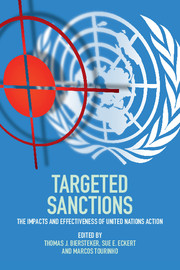Book contents
- Frontmatter
- Contents
- List of figures
- List of tables
- List of contributors
- List of abbreviations
- Introduction
- 1 Thinking about United Nations targeted sanctions
- 2 The purposes of targeted sanctions
- 3 Security Council dynamics and sanctions design
- 4 United Nations targeted sanctions and other policy tools: diplomacy, legal, use of force
- 5 The relationship between United Nations sanctions and regional sanctions regimes
- 6 Coordination of United Nations sanctions with other actors and instruments
- 7 Implementation of United Nations targeted sanctions
- 8 The impacts of United Nations targeted sanctions
- 9 The unintended consequences of United Nations targeted sanctions
- 10 The effectiveness of United Nations targeted sanctions
- 11 Institutional learning in targeting sanctions
- 12 Conclusion
- Appendix 1 List of cases and episodes
- Appendix 2 Sanctions effectiveness
- Appendix 3 TSC database codebook
- Appendix 4 Targeted Sanctions Consortium (TSC) participants
- Bibliography
- Index
9 - The unintended consequences of United Nations targeted sanctions
Published online by Cambridge University Press: 05 March 2016
- Frontmatter
- Contents
- List of figures
- List of tables
- List of contributors
- List of abbreviations
- Introduction
- 1 Thinking about United Nations targeted sanctions
- 2 The purposes of targeted sanctions
- 3 Security Council dynamics and sanctions design
- 4 United Nations targeted sanctions and other policy tools: diplomacy, legal, use of force
- 5 The relationship between United Nations sanctions and regional sanctions regimes
- 6 Coordination of United Nations sanctions with other actors and instruments
- 7 Implementation of United Nations targeted sanctions
- 8 The impacts of United Nations targeted sanctions
- 9 The unintended consequences of United Nations targeted sanctions
- 10 The effectiveness of United Nations targeted sanctions
- 11 Institutional learning in targeting sanctions
- 12 Conclusion
- Appendix 1 List of cases and episodes
- Appendix 2 Sanctions effectiveness
- Appendix 3 TSC database codebook
- Appendix 4 Targeted Sanctions Consortium (TSC) participants
- Bibliography
- Index
Summary
Extensive research has been conducted over the past decades to understand the use of targeted sanctions by the United Nations. While a great deal of the research has appraised sanctions effectiveness, less attention has been invested in critically seeking to understand the unintended consequences of UN targeted sanctions. In an attempt to throw light on this understudied aspect of targeted sanctions, this chapter will look more carefully at the various unanticipated implications of UN targeted sanctions policies related to the threat, decision, adoption, and subsequent implementation of United Nations Security Council resolutions. This will be done with an analysis of the new data introduced in this book.
Unintended consequences of UN targeted sanctions are defined as those observable policy effects not anticipated or simply overlooked by the sender at the time when a decision was made to impose targeted sanctions. An essential criterion for identifying unintended consequences is if the policy implications to impose sanctions went beyond the goal of the UN Resolution establishing the sanctions regime. The definition used here builds on the understanding of unintended consequences applied in similar studies of unintended consequences, that is, unanticipated, overlooked, or perverse side effects of a policy objective. However, unlike conventional perspectives on unintended consequences of social action which essentially consider them undesirable, the definition used here allows the possibility that unintended consequences can be positive or negative and that they can have effects on both the sanctions sending body and the listed target.
There are many good reasons to examine the unintended consequences of targeted sanctions, of which three stand out. First, there has been no systematic study made of the unintended consequences of targeted sanctions. While the sanctions scholarship has produced much insight on the unintended consequences of comprehensive sanctions, there has been little systematic data to substantiate or refute similar critiques of targeted UN sanctions. Prior to the Targeted Sanctions Consortium initiative, the unintended consequences of targeted sanctions could only be derived from ad hoc testimonies and anecdotal examples from specific sanctions regimes.
Second, this is an important question to examine because the principal rationale for the UN Security Council's shift to targeted sanctions was to counter criticisms of the negative humanitarian consequences resulting from comprehensive sanctions in the 1990s.
- Type
- Chapter
- Information
- Targeted SanctionsThe Impacts and Effectiveness of United Nations Action, pp. 190 - 219Publisher: Cambridge University PressPrint publication year: 2016
- 5
- Cited by



